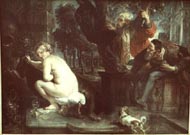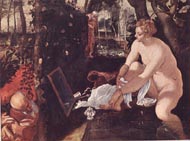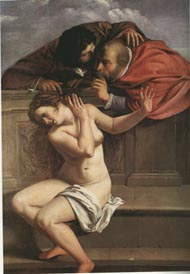
|
|
|
Guercino, Susanna and the Elders, 1617. |
A popular image in sixteenth-eighteenth-century art is the Old Testament story of Susanna and the Elders. The images are based on the following passage from the 13th chapter of the book of Daniel:
1 Now there was a man that dwelt in Babylon, and his name was Joakim:
2 And he took a wife, whose name was Susanna, the daughter of Helcias, a very
beautiful woman, and one that feared God.
3 For her parents being just, had instructed their daughter according to the
law of Moses.
4 Now Joakim was very rich, and had an orchard near his house: and the Jews
resorted to him, because he was the most honourable of them all.
5 And there were two of the ancients of the people appointed judges that year,
of whom the Lord said: That iniquity came out from Babylon, from the ancient
judges, that seemed to govern the people.
6 These men frequented the house of Joakim, and all that hand any matters of
judgment came to them.
7 And when the people departed away at noon, Susanna went in, and walked in
her husband's orchard.
8 And the old men saw her going in every day, and walking: and they were inflamed
with lust towards her:
9 And they perverted their own mind, and turned away their eyes, that they might
not look unto heaven, nor remember just judgments.
10 So they were both wounded with the love of her, yet they did not make known
their grief one to the other.
11 For they were ashamed to declare to one another their lust, being desirous
to have to do with her:
12 And they watched carefully every day to see her. And one said to the other:
13 Let us now go home, for it is dinner time. So going out, they departed one
from another.
14 And turning back again, they came both to the same place: and asking one
another the cause, they acknowledged their lust: and then they agreed together
upon a time, when they might find her alone.
15 And it fell out, as they watched a fit day, she went in on a time, as yesterday
and the day before, with two maids only, and was desirous to wash herself in
the orchard: for it was hot weather.
16 And there was nobody there, but the two old men that had hid themselves,
and were beholding her.
17 So she said to the maids: Bring me oil, and washing balls, and shut the doors
of the orchard, that I may wash me.
18 And they did as she bade them: and they shut the doors of the orchard, and
went out by a back door to fetch what she had commanded them, and they knew
not that the elders were hid within.
19 Now when the maids were gone forth, the two elders arose, and ran to her,
and said:
20 Behold the doors of the orchard are shut, and nobody seeth us, and we are
in love with thee: wherefore consent to us, and lie with us.
21 But if thou wilt not, we will bear witness against thee, that a young man
was with thee, and therefore thou didst send away thy maids form thee.
22 Susanna sighed, and said: I am straitened on every side: for if I do this
thing, it is death to me: and if I do it not, I shall not escape your hands.
23 But it is better for me to fall into your hands without doing it, than to
sin in the sight of the Lord.
24 With that Susanna cried out with a loud voice: and the elders also cried
out against her.
25 And one of them ran to the door of the orchard, and opened it.
26 So when the servants of the house heard the cry in the orchard, they rushed
in by the back door, to see what was the matter.
27 But after the old men had spoken, the servants were greatly ashamed: for
never had there been any such word said of Susanna. And on the next day,
28 When the people were come to Joakim, her husband, the two elders also came
full of wicked device against Susanna, to put her to death.
29 And they said before the people: Send to Susanna, daughter of Helcias, the
wife of Joakim. And presently they sent.
30 And she came with her parents, and children and all her kindred.
31 Now Susanna was exceeding delicate, and beautiful to behold.
32 But those wicked men commanded that her face should be uncovered, (for she
was covered) that so at least they might be satisfied with her beauty.
33 Therefore her friends, and all her acquaintance wept.
34 But the two elders rising up in the midst of the people, laid their hands
upon her head.
35 And she weeping, looked up to heaven, for her heart had confidence in the
Lord.
36 And the elders said: As we walked in the orchard alone, this woman came in
with two maids, and shut the doors of the orchard, ans sent away the maids from
her.
37 Then a young man that was there hid came to her, and lay with her.
38 But we that were in a corner of the orchard, seeing this wickedness, ran
up to them, and we saw them lie together.
39 And him indeed we could not take, because he was stronger than us, and opening
the doors, he leaped out:
40 But having taken this woman, we asked who the young man was, but she would
not tell us: of this thing we are witnesses.
41 The multitude believed them, as being the elders, and the judges of the people,
and they condemned her to death.
42 Then Susanna cried out with a loud voice, and said: O eternal God, who knowest
hidden things, who knowest all things before they come to pass,
43 Thou knowest that they have borne false witness against me: and behold I
must die, whereas I have done none of these things, which these men have maliciously
forged against me.
44 And the Lord heard her voice.
45 And when she was led to be put to death, the Lord raised up the holy spirit
of a young boy, whose name was Daniel:
46 And he cried out with a loud voice: I am clear from the blood of this woman.
47 Then all the people turning themselves towards him, said: What meaneth this
word that thou hast spoken?
48 But he standing in the midst of them, said: Are ye so foolish, ye children
of Israel, that without examination or knowledge of the truth, you have condemned
a daughter of Israel?
49 Return to judgment, for they have borne false witness against her.
50 So all the people turned again in haste, and the old men said to him: Come,
and sit thou down among us, and shew it us: seeing God hath given thee the honour
of old age.
51 And Daniel said to the people: Separate these two far from one another, and
I will examine them.
52 So when they were put asunder one from the other, he called one of them,
and said to him: O thou that art grown old in evil days, now are thy sins come
out, which thou hast committed before:
53 In judging unjust judgments, oppressing the innocent, and letting the guilty
to go free, whereas the Lord saith: The innocent and the just thou shalt not
kill.
54 Now then if thou sawest her, tell me under what tree thou sawest them conversing
together: He said: Under a mastic tree.
55 And Daniel said: Well hast thou lied against thy own head: for behold the
angel of God having received the sentence of him, shall cut thee in two.
56 And having put him aside, he commanded that the other should come, and he
said to him: O thou seed of Chanaan, and not of Juda, beauty hath deceived tee,
and lust hath perverted thy heart:
57 Thus did you do to the daughters of Israel, and they for fear conversed with
you: but a daughter of Juda would not abide your wickedness.
58 Now, therefore, tell me, under what tree didst thou take them conversing
together. And he answered: Under a holm tree.
59 And Daniel said to him: Well hast thou also lied against thy own head: for
the angel of the Lord waiteth with a sword to cut thee in two, and to destroy
you.
60 With that all the assembly cried out with a loud voice, and they blessed
God, who saveth them that trust in him.
61 And they rose up against the two elders, (for Daniel had convicted them of
false witness by their own mouth) and they did to them as they had maliciously
dealt against their neighbour,
62 To fulfil the law of Moses: and they put them to death, and innocent blood
was saved in that day.
63 But Helcias, and his wife, praised God, for their daughter, Susanna, with
Joakim, her husband, and all her kindred, because there was no dishonesty found
in her.
64 And Daniel became great in the sight of the people from that day, and thence
forward.
Mary Garrard ("Artemisia and Susanna," Feminism and Art History: Questioning the Litany, Norma Broude and Mary D. Garrard, eds., pp. 146-171) presents the following useful account of these paintings:
Few artistic themes have offered so satisfying an opportunity for legitimized voyeurism as Susanna and the Elders. The subject was taken up by relish by artists from the sizteenth through eighteenth centuries as an opportunity to display the female nude, in much the same spirit that such themes as Danae or Lucretia were approached, but with the added advantage that the nude's erotic could be heightened by the presence of two lecherous old men, whose inclusion was both iconographically justified and pornographically effective. It is a remarkable testament to the indomitable male ego that a biblical theme holding forth an exemplum of female chastity should have become in painting a celebration of sexual opportunity. or as Max Rooses enthusiastically described Rubens's version, a "gallant enterprise mounted by two adventurers."

|
|
|
Guercino, Susanna and the Elders, 1617. |
Tintoretto, whose adventurers stage their advance in a manner more sneaky than bold, nonetheless offers a representative depiction of the theme in his emphasis upon Susanna's voluptuous body and upon the Elders' ingenuity in getting a closer look at it (pp. 149-150)

|
|
|
|
The
picture above accompanied a New York Times review of a Tintoretto show
held at the Prado Museum in Madrid during the Spring of 2007. |
Guido Reni, Susanna and the Elders, c. 1620. What do you make of Susanna's gesture of her right hand? |
Griselda Pollock (Differencing the Canon , p. 105) has presented the following useful summary of the subject:
The biblical story of Susanna and the Elders tells of a young married Jewish woman living in Babylon during the first exile of the Jewish people (after 586 BCE.). Susanna is bathing in her garden. She sends her two maids into the house to fetch oil and perfumes for her bath. Two lecherous elders of the community spy on her, conspiring to force her to submit to them sexually. They threaten her that, if she refuses, they will denounce her of adultery with another man, adultery being, according to ancient Jewish law, a capital crime for women. Susanna refuses, preferring the fate of death to the sin they propose. She is then falsely accused by the leders and condemned to death. Daniel, of leonine fame, vindicates Susanna by exposing the elders' mendacity. Interrogating them separately, he asks them under which tree Susanna committed adultery. Each names a different kind of tree. They are then executed for the crime of false witness.
The story is a complex narrative of sexual desire and visual temptation, female chastity and masculine law. During the Renaissance the dramatic focus on the moment of the woman's nakedness while bathing exposed to a lecherous conspiracy emphasized the sexual, voyeuristic and visually violating aspects of the theme, while providing a biblical and even theological justification for the painting of an erotic female nude, a genre that was emerging in this period, shifting the connotations of the female nude from its traditional iconographic association with Truth towards its modern signification of (masculine) desire and its privileged visuality.
The focus of Garrard's and Pollock's studies of the subject of Susanna and the Elders is a painting of the same subject by Artemisia Gentileschi:

Compare Artemisia's version of the subject to those by Tintoretto and Rubens.
Judith and Holofernes
Judith, 13:1-26:
1 And when it was grown late, his servants made haste to their lodgings, and Vagao shut the chamber doors, and went his way. 2 And they were all overcharged with wine. 3 And Judith was alone in the chamber. 4 But Holofernes lay on his bed, fast asleep, being exceedingly drunk. 5 And Judith spoke to her maid to stand without before the chamber, and to watch: 6 And Judith stood before the bed praying with tears, and the motion of her lips in silence, 7 Saying: Strengthen me, O Lord God of Israel, and in this hour look on the works of my hands, that as thou hast promised, thou mayst raise up Jerusalem thy city: and that I may bring to pass that which I have purposed, having a belief that it might be done by thee. 8 And when she had said this, she went to the pillar that was at his bed's head, and loosed his sword that hung tied upon it. 9 And when she had drawn it out, she took him by the hair of his head, and said: Strengthen me, O Lord God, at this hour. 10 And she struck twice upon his neck, and cut off his head, and took off his canopy from the pillars, and rolled away his headless body. 11 And after a while she went out, and delivered the head of Holofernes to her maid, and bade her put it into her wallet. 12 And they two went out according to their custom, as it were to prayer, and they passed the camp, and having compassed the valley, they came to the gate of the city. 13 And Judith from afar off cried to the watchmen upon the walls: Open the gates for God is with us, who hath shown his power in Israel.
14 And it came to pass, when the men had heard her voice, that they called the ancients of the city. 15 And all ran to meet her from the least to the greatest: for they now had no hopes that she would come. 16 And lighting up lights they all gathered round about her: and she went up to a higher place, and commanded silence to be made. And when all had held their peace, 17 Judith said: Praise ye the Lord our God, who hath not forsaken them that hope in him. 18 And by me his handmaid he hath fulfilled his mercy, which he promised to the house of Israel: and he hath killed the enemy of his people by my hand this night. 19 Then she brought forth the head of Holofernes out of the wallet, and showed it them, saying: Behold the head of Holofernes the general of the army of the Assyrians, and behold his canopy, wherein he lay in his drunkenness, where the Lord our God slew him by the hand of a woman. 20 But as the same Lord liveth, his angel hath been my keeper both going hence, and abiding there, and returning from thence hither: and the Lord hath not suffered me his handmaid to be defiled, but hath brought me back to you without pollution of sin, rejoicing for his victory, for my escape, and for your deliverance. 21 Give all of you glory to him, because he is good, because his mercy endureth for ever. 22 And they all adored the Lord, and said to her: The Lord hath blessed thee by his power, because by thee he hath brought our enemies to nought. 23 And Ozias the prince of the people of Israel, said to her: Blessed art thou, O daughter, by the Lord the most high God, above all women upon the earth. 24 Blessed be the Lord who made heaven and earth, who hath directed thee to the cutting off the head of the prince of our enemies. 25 Because he hath so magnified thy name this day, that thy praise shall not depart out of the mouth of men who shall be mindful of the power of the Lord for ever, for that thou hast not spared thy life, by reason of the distress and tribulation of thy people, but hast prevented our ruin in the presence of our God. 26 And all the people said: So be it, so be it.
(see linked webpage)
Donatello, Judith and Holofernes, c, 1446-60. Perhaps commissioned by a member of the member of the Medici family to be placed in the garden of the Medici Palace. Donatello's statue was moved in 1495 when the Medicis were expelled from Florence to the left of the main door of the Palazzo Vecchio, the spot which would later be the position of Michelangelo's David. Read Yael Even, "The Loggia dei Lanzi: A Showcase of Female Subjugation," Woman's Art Journal, 12, 1991, pp. 10-14 (Download from JSTOR). |
||
|
Cristofano Allori, Judith with the Head of Holofernes. |
||